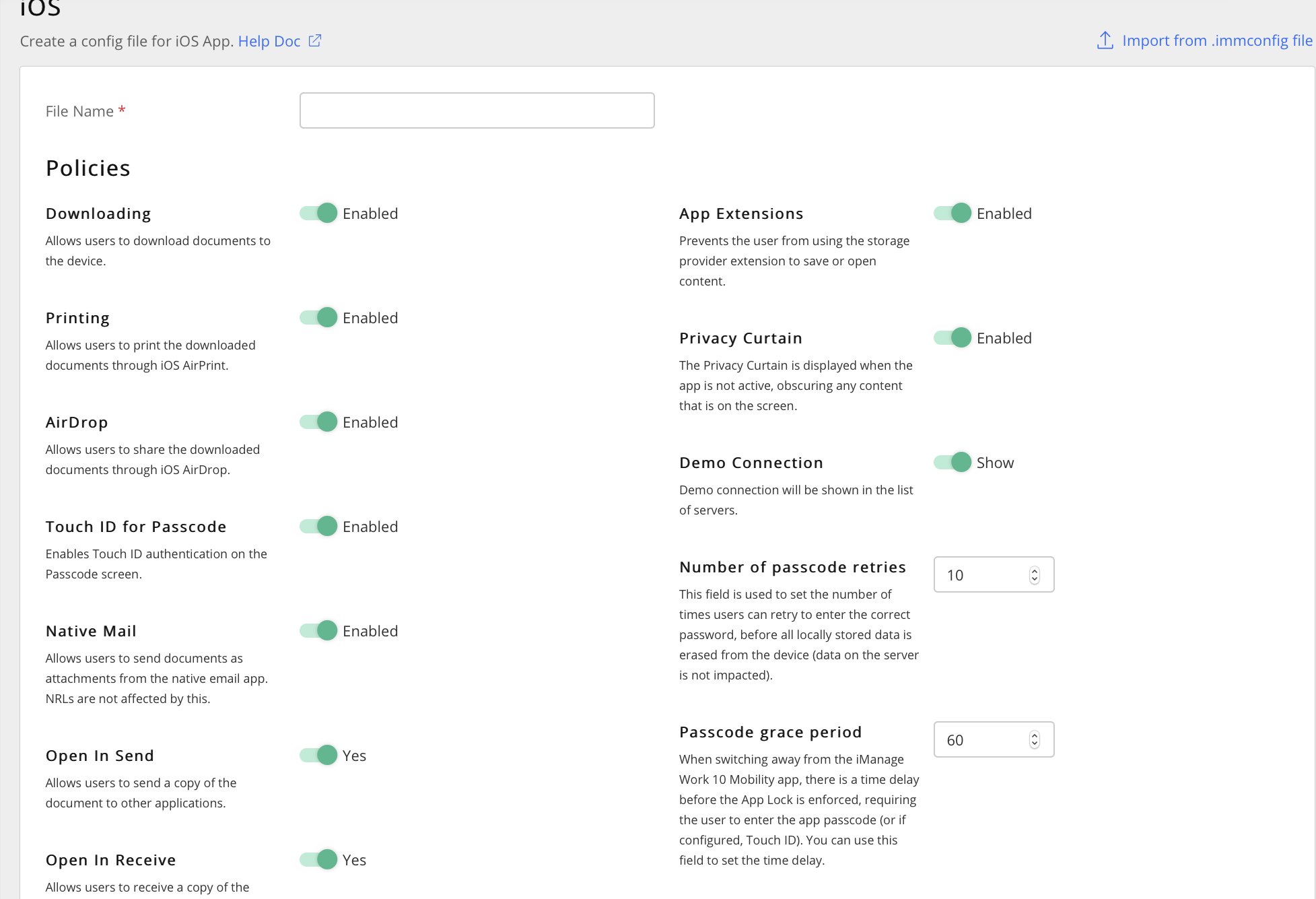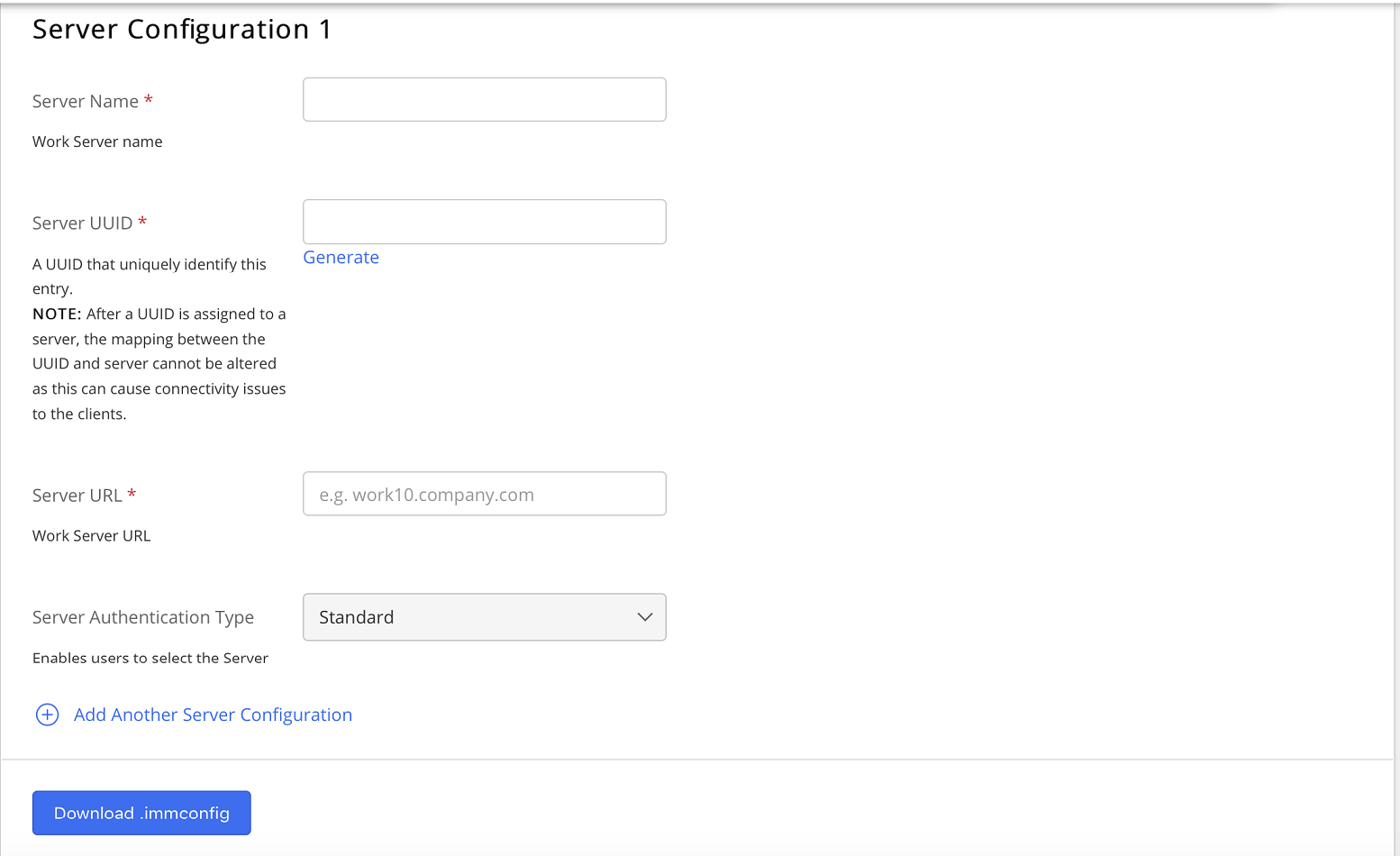The following settings configure iManage Mobility for IOS when you are not using a 3rd-Party MDM solution such as Blackberry Dynamics, MobileIron, or Intune.
NOTE: To perform operations on the iOS page, the user must be a member of the NRTADMIN group.
Select SETTINGS > iOS. The following iOS page appears:
Figure: iOS page part 1Figure: iOS page part 2In the File Name field, enter a file name.
The configuration files are saved in.immconfigformat. Alternatively, you can upload an existing file to edit the policies. For more information, refer to Editing an existing .immconfig File.Enable, disable or enter values for the following options:
IMPORTANT: There are interdependencies that must be examined carefully in Managed App Configuration Policies.The following table identifies the available policies (see Figure: iOS page part 1) in iManage Control Center and a brief description of their use in iManage Work 10 Mobility.
Option | Description |
|---|---|
Downloading | Allows users to download documents from iManage Work Mobility for iOS to their mobile devices. This option is enabled by default. |
Printing | Allows users to print documents in iManage Work Mobility for iOS through iOS AirPrint. This option is enabled by default. NOTE: If the open in send option is set to false, AirPrint is always disabled. |
AirDrop | Allows users to use AirDrop to transfer documents in iManage Work Mobility for iOS to supported macOS computers and iOS devices. This option is enabled by default. |
Touch ID for Passcode | Enables users to use Touch ID to sign in to iManage Work Mobility for iOS on their mobile device. This option is enabled by default. |
Native Mail | Allows users to send documents as email attachment from iManage Work Mobility for iOS through the native email (Mail app) application. This option is enabled by default and does not affect document NRLs. |
Open In Send | Allows users to send documents in iManage Work Mobility for iOS to other applications through the Open In feature. This option is enabled by default. |
Open In Receive | Allows users to receive document(s) to iManage Work Mobility for iOS from other applications through the Open In feature. This option is enabled by default. |
App Extensions | Prevents users from using Storage Provider Extension (SPE), which allows native applications to access documents from users device in a safe and convenient way. This option is enabled by default (SPE disabled). |
Privacy Curtain | Enables Privacy Curtain, which is a security feature that obscures the contents of iManage Work Mobility for iOS when it is not active. This option is enabled by default. |
Demo Connection | Shows the demonstration iManage system on the Sign In screen of iManage Work Mobility for iOS. This option is enabled by default. |
Number of passcode retries | Sets the number of times a user can enter the app passcode, before all locally stored data is erased from the iOS mobile device (data in iManage is not impacted). |
Passcode grace period | Sets the time delay before the App Lock is enforced when switching away from iManage Work Mobility for iOS. Users must enter the app passcode (or use Touch ID if configured) to sign in to iManage Work Mobility for iOS. |
Enter the following Server Configuration details (refer to Figure: iOS page part 2):
Field | Description | |
|---|---|---|
Server Name (Mandatory) | Enter the iManage Work name that is displayed in the application to your end users. | |
Server UUID (Mandatory) | Enter the UUID that uniquely identifies this entry. You can either enter the UUID or select Generate to generate a unique UUID. NOTE:
| |
Server URL (Mandatory) | Enter the iManage Work URL. | |
Server Authentication Type | Standard | Supports both Work credentials and domain/username and password for explicit network authentication. |
ADFS | Displays an embedded web view where the user must follow whatever authentication procedures the company has defined for the ADFS implementation. | |
Common Login | Provides a single sign-on for iManage Work client applications. The login dialog box maintains information about the currently signed-in user in its session cookie. iCC supports common login for SAML, explicit, and network login types. | |
Common Login (Oauth 2.0) | Provides a single sign-on for iManage Work client applications when using the iManage Work at cloudimanage.com. The login dialog box maintains information about the currently signed-in user in its session cookie. This option minimizes the number of times a user is prompted to sign in by using Oauth 2.0 Refresh Token and Access Tokens. | |
Select this option if you want to add another server configuration details. This is useful when users need to sign in to multiple different iManage Work environments using the iManage Work 10 Mobility app. | ||
IMPORTANT: If you must use special characters in the .immconfig file, ensure you use the corresponding encoded value instead of string literal.
For string literal “, use encoded value ".
For string literal ', use encoded value &apos.
For string literal <, use encoded value <.
For string literal >, use encoded value >.
For string literal &, use encoded value &.
Select Download .immconfig to save your settings and download the
.immconfigfile.
CAUTION: You must select Download .immconfig before navigating away from the page.


